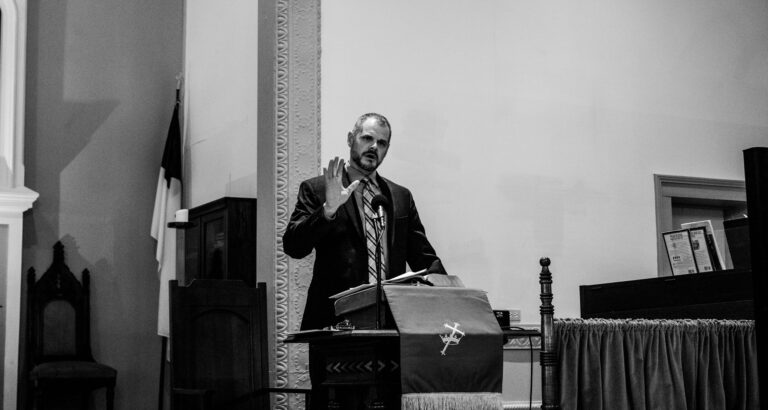How many meals in your life do you remember? [1]
Maybe there were a few that stood out to you because they were so good. Maybe a few that you remember because they were so terribly bad. Maybe you remember a meal because of when you had it or where you had it. I remember my first meal after getting married to my lovely wife, not because the meal was delicious but because of the occasion.
But of the thousands and thousands of meals that you’ve had in your life, the overwhelming majority of them were not memorable. They were ordinary, perhaps boring, meals. I’m sure a great many of them were two or three or perhaps four day old leftovers. Nothing exciting at all. Yet, those meals nourished you. They brought you to where you are today. They have given you life and were your daily bread.
Food companies want to make food more memorable so they load it up with all kinds of processed goodies to make it more exciting. And we Americans, by and large, love it. High fructose corn syrup, seed oils, artificial colors and flavors and sweeteners like aspartame and sucralose… and many other processed ingredients are slowly killing us.
But the foods that contain these things are convenient, exciting, packaged in attractive ways and often very cheaply for consumers.
Tish Warren says that many Christians today have applied this mealtime consumer approach to their religion. We long for a sugar rush of sorts. When we come to church we want something exciting, passionate, and filled with energy. We want a rush. Something like we might get from a bag of Doritos or drinking a Red Bull.
She writes that instead of the worship being focused upon the things that nourish us, namely Word and sacrament, the focus has shifted to that “which sells: excitement, adventure, a sizzling or shocking spiritual experience.” [2]
Some have called this “worshiptainment.”[3] It is worship packed as a consumer item to give a sugar rush of sorts.
Of course, worship at times does have these “sugar rush” moments. We recently looked at some of these moments in the worship of Israel in Leviticus 23. That chapter outlines God’s appointed feasts for Israel—the high holy days and times and seasons where special commemorations took place. Today we might think of celebrations such as Christmas or Easter or Pentecost as special, high moments when worship is especially powerful.
Yet in the very next chapter, Leviticus 24, God says as special as those appointed feasts are, and as much as Israel was to give attention to them, they were not to forget about the ordinary times. Israel, was not to neglect the daily nourishment. They were not to miss the importance of the leftover, forgettable meals that kept them going. Notice in verse 2: “Command the people of Israel to bring you pure oil from beaten olives for the lamp, that a light may be kept burning regularly.” The priests were commanded to be sure that the light of the menorah inside the holy place was kept burning. However, it was the people, who were to provide the olive oil to fuel the lights. Day by day, fresh oil would need to be made and brought to the priests. The same was true of the fine flour which was baked for the Bread of the Presence, mentioned in verses 5 through 9. These ordinary tasks of crushing the olives, making oil and fine flour, and the daily refilling and lighting of the lamps were all very small tasks but important acts of worship that God commanded.
After doing these tasks for weeks and then months and years on end one can only imagine how mundane all of this would feel. Perhaps they would occasionally have the thought: “Does this even matter? Am I making a real difference in anything in this world?” Yet it was these small acts that God had appointed to be one of the visible means by which he would remind his people of his ongoing presence with them. When lit, the menorah in the tent of meeting would have looked like a stylized tree on fire, harkening back to the burning bush of Exodus 3 when God gave Moses his covenant name, “I am who I am” (Yahweh). The burning lamps in the tent would have been a constant reminder of the covenant God’s presence among His people. Pressing oil and making fine flour for the lamps may seem like a tedious or monotonous ritual with little significance but in the Lord’s eyes all of this mattered.
New Covenant Worship
Believers under the New Covenant, no doubt, are often tempted to fall into the struggle, especially in today’s celebrity culture. We can think of the celebrity leaders as the ones who are truly doing the important work that matters. Yet, Jesus himself said that giving someone a cup of cold water merely because they are a believer, is a significant act that God will not forget (Matthew 10:42).
Likewise, in our assembled worship, what might feel like small, insignificant acts, are hugely significant. Take, for instance, the regularly partaking of the body and blood of Christ. In the Supper, common, everyday elements are filled with massive meaning. Just as the 12 loaves of the Bread of the Presence was a reminder of God’s presence with the tribes of Old Covenant Israel, the bread and cup we partake of in the New Covenant is a tangible reminder of Christ’s sacrifice for us. In the celebration of the Supper, believers literally ingest the elements and are physically nourished by them. This meal which most believers consumer perhaps hundreds if not thousands of times across the years, may not be the sugar high that so many crave today, but it most certainly not insignificant.
The same is true of the Word of God, which Jesus said we must all live on (Matthew 4:4). The regular reading and proclamation of the truth may not come with great thrill each week but that is not a testimony to its lack of power but rather our blindness and spiritual poverty. May God work in our hearts that we would see these common things, word and Sacrament, as the glorious and beautiful things that they truly are—that in them we feast upon Christ and Christ is truly all we need!
[1] The post was inspired by Tish Harrison Warren’s chapter “Eating Leftovers” in her book Liturgy of the Ordinary (IVP, 2019).
[2] Warren, Liturgy of the Ordinary, 66-67.
[3] Matthew Everhard, Worshiptainment: The Modern Church’s Golden Calf (Self Published by Matthew Everhard).



